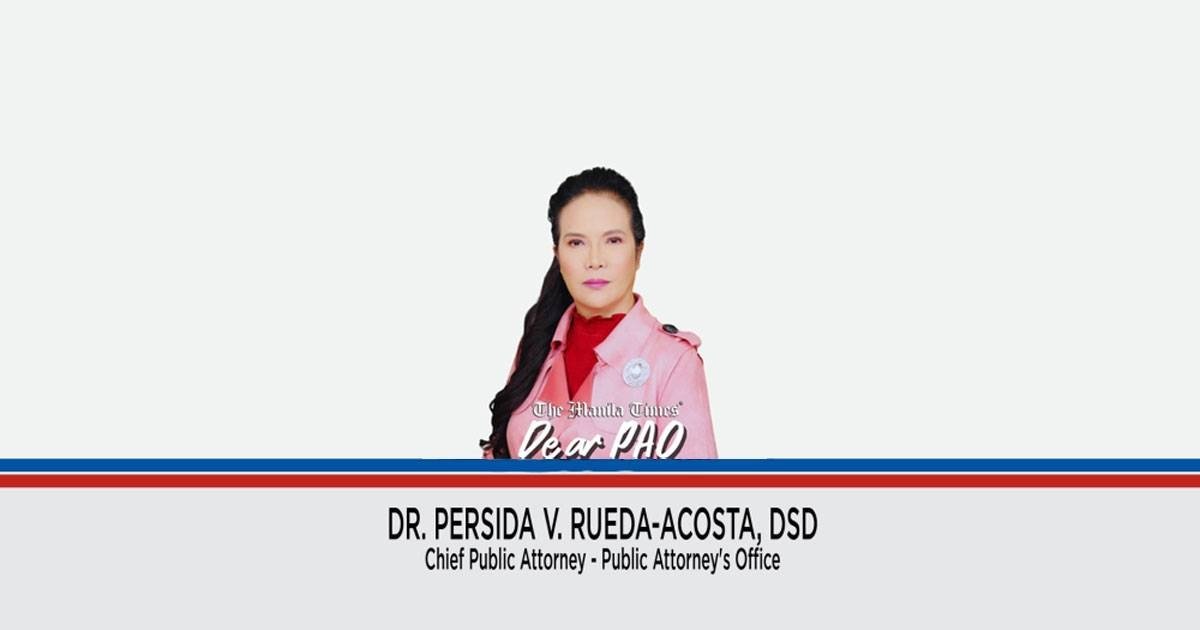Dear PAO,
My uncle was hospitalized and underwent an operation. Unfortunately, he was paralyzed after the procedure. My aunt is unsure if there was negligence on the part of the surgeon. She is contemplating filing a complaint, but she is worried that she may not have any evidence to prove such negligence. Someone told her about the terminology of “res ipsa loquitur”; that the fact that my uncle was paralyzed after the procedure is, in itself, proof of negligence on the part of the surgeon. What does this terminology mean, and what are the requisites in order to apply it?
Cassie
Dear Cassie,
A thorough explanation of the legal doctrine of Res Ipsa Loquitur has been imparted by our Supreme Court in its Decision, as penned by then associate justice, who later became chief justice, and now executive secretary, Lucas Bersamin, in the case of Dr. Fernando Solidum v. People of the Philippines (GR 192123, March 10, 2014):
“Res ipsa loquitur is literally translated as ‘the thing or the transaction speaks for itself.’ The doctrine res ipsa loquitur means that ‘where the thing which causes injury is shown to be under the management of the defendant, and the accident is such as in the ordinary course of things does not happen if those who have the management use proper care, it affords reasonable evidence, in the absence of an explanation by the defendant, that the accident arose from want of care.’ It is simply ‘a recognition of the postulate that, as a matter of common knowledge and experience, the very nature of certain types of occurrences may justify an inference of negligence on the part of the person who controls the instrumentality causing the injury in the absence of some explanation by the defendant who is charged with negligence. It is grounded in the superior logic of ordinary human experience and on the basis of such experience or common knowledge, negligence may be deduced from the mere occurrence of the accident itself.
“Hence, res ipsa loquitur is applied in conjunction with the doctrine of common knowledge.
“Jarcia, Jr. v. People has underscored that the doctrine is not a rule of substantive law, but merely a mode of proof or a mere procedural convenience. The doctrine, when applicable to the facts and circumstances of a given case, is not meant to and does not dispense with the requirement of proof of culpable negligence against the party charged. It merely determines and regulates what shall be prima facie evidence thereof, and helps the plaintiff in proving a breach of the duty. The doctrine can be invoked when and only when, under the circumstances involved, direct evidence is absent and not readily available.x x x
“In order to allow resort to the doctrine, therefore, the following essential requisites must first be satisfied, to wit: (1) the accident was of a kind that does not ordinarily occur unless someone is negligent; (2) the instrumentality or agency that caused the injury was under the exclusive control of the person charged; and (3) the injury suffered must not have been due to any voluntary action or contribution of the person injured.” (Emphasis supplied)
In the situation which you have shared with us and applying the foregoing jurisprudence, we submit that the following circumstances must be established by your uncle, through your aunt, if they ultimately decide to pursue a legal action and employ the doctrine of res ipsa loquitur in proving the liability of the surgeon: (1) your uncle’s paralysis is one that does not necessarily happen lest the surgeon who operated on him was careless or neglectful of one’s duties as a physician; (2) the procedure or the part thereof which caused the injury is within the exclusive control of said surgeon; and (3) there was no contributory act or negligence on the part of your uncle that led to his paralysis.
At this point, it will be best for your aunt to personally confer with a lawyer so that all the aspects of your uncle’s legal concerns can be properly assessed and the documents or evidence relating thereto be carefully evaluated. If your uncle cannot afford the services of a private lawyer and he is a qualified indigent, your aunt may opt to personally visit our district office that is nearest their residence in order for her to be given prompt and adequate legal advice. Our district offices are usually located at or near the municipal, city or provincial hall, or hall of justice of each respective municipality, city or province.
We hope that we were able to answer your queries. Please be reminded that this advice is based solely on the facts you have narrated and our appreciation of the same. Our opinion may vary when other facts are changed or elaborated.
Editor’s note: Dear PAO is a daily column of the Public Attorney’s Office. Questions for Chief Acosta may be sent to [email protected]




